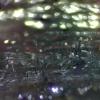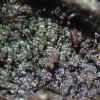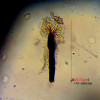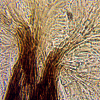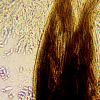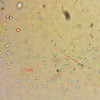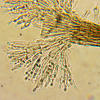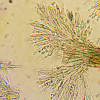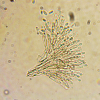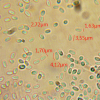
27-02-2026 17:51
 Michel Hairaud
Michel Hairaud
Bonjour, Quelqu'un peut il me donner un conseil p

27-02-2026 16:17
 Mathias Hass
Mathias Hass
Hi, Found this on Betula, rather fresh fallen twi

28-02-2026 14:43
A new refrence desired :Svanidze, T.V. (1984) Novy

01-03-2026 18:02
 Francois Guay
Francois Guay
I found this mystery Helotiales on an incubated le

01-03-2026 14:10
 Antonio Couceiro
Antonio Couceiro
Hola, me gustaria conocer opiniones sobre este tem

01-03-2026 18:46
 Robin Isaksson
Robin Isaksson
Hi! This species i se from time to time in the

01-03-2026 08:55
 Michel Hairaud
Michel Hairaud
Bonjour , Je souhaiterais recevoir cet article :�
Black stem, slimy head. Anamorph?
Jan-Arne Mentken,
27-02-2017 13:15
two days ago I found this pretty small species on the bottom of dead wood, probably Fagus. I found it at two locations. They are about 0,5 mm high, Spores (about 5-6 x 3-4 µm) look like oval rings with a slimy shell if I can say so. It looks like conidia. I would guess that this species is not that rare, but can just not be seen that easily. Also I don't really know, how/where to search for a name.
Can anyone help? Thank you!
Best regards,
Jan-Arne
Joanne Taylor,
27-02-2017 14:29
Re : Black stem, slimy head. Anamorph?
HI Jan-Arne,
This is some sort of synnematous hyphomycete (sometimes ascomycetes with long necks produces spores in a mass at the top, but this does look like a hyphomycete). You would be best to consult Seifert et al. (2011) The Genera of Hyphomycetes. Or, as you know the host (and it is in Europe), you might try Ellis and Ellis (1997) Microfungi on Land Plants. What you need to do is establish the mode of conidiogensis. If you can clearly show the conidiogenous cells (the cells that produce the spores) then someone on this forum can help you. Without this there are many synnematous hyphomycetes with hyaline, non-septate spores that it could be.
Hope that helps,
Jo
This is some sort of synnematous hyphomycete (sometimes ascomycetes with long necks produces spores in a mass at the top, but this does look like a hyphomycete). You would be best to consult Seifert et al. (2011) The Genera of Hyphomycetes. Or, as you know the host (and it is in Europe), you might try Ellis and Ellis (1997) Microfungi on Land Plants. What you need to do is establish the mode of conidiogensis. If you can clearly show the conidiogenous cells (the cells that produce the spores) then someone on this forum can help you. Without this there are many synnematous hyphomycetes with hyaline, non-septate spores that it could be.
Hope that helps,
Jo
Jan-Arne Mentken,
27-02-2017 16:06
Re : Black stem, slimy head. Anamorph?
Hi Jo,
thank you very much! That really helped. Unfortunately I don't own The Genera of Hyphomycetes as this is the first time I get in touch with a species of this group. Also I will get Ellis & Ellis soon, but don't have it yet. Nevertheless the fact that you could help me finding the right group is a success. I don't really have the skills nor the equipment to show good pictures of the conidiogenous cells and don't really think the given pictures will help.
Best regards,
Jan-Arne
thank you very much! That really helped. Unfortunately I don't own The Genera of Hyphomycetes as this is the first time I get in touch with a species of this group. Also I will get Ellis & Ellis soon, but don't have it yet. Nevertheless the fact that you could help me finding the right group is a success. I don't really have the skills nor the equipment to show good pictures of the conidiogenous cells and don't really think the given pictures will help.
Best regards,
Jan-Arne
Joanne Taylor,
27-02-2017 17:51
Re : Black stem, slimy head. Anamorph?
It certainly looks phialidic if not annellidic, and if it is the latter it might be a Graphium but the conidiogenous cells look a bit plump. See Okada (2000) Studies in Mycology, No. 45: 169-188. Try Graphium calicioides which is now Exophiala calicioides and see a previous post on Ascofrance http://www.mycodb.fr/fiche.php?genre=Graphium&espece=calicioides
Jo
Jo
Jan-Arne Mentken,
27-02-2017 19:04
Re : Black stem, slimy head. Anamorph?
Hello again!
Though the spores look a bit strange with that ring and the slimy surrounding it seems possible that I just measured wrong and should ignore the slime around. The length and width would fit. Unfortunately all the pictures of the spores I can find on the internet are really small. Still these look like they are that ringlike with white center as well: http://asco-sonneberg.de/pages/gallery/graphium-calicioides-151119-mik-coljj38671.php?group_id=38670&position=2
I just drove to a friend of mine and borrowed Ellis & Ellis. Using the key I am coming to the same species. Also it says that it's common. I think that's it. Thank you so much!
Kind regards,
Jan-Arne
Though the spores look a bit strange with that ring and the slimy surrounding it seems possible that I just measured wrong and should ignore the slime around. The length and width would fit. Unfortunately all the pictures of the spores I can find on the internet are really small. Still these look like they are that ringlike with white center as well: http://asco-sonneberg.de/pages/gallery/graphium-calicioides-151119-mik-coljj38671.php?group_id=38670&position=2
I just drove to a friend of mine and borrowed Ellis & Ellis. Using the key I am coming to the same species. Also it says that it's common. I think that's it. Thank you so much!
Kind regards,
Jan-Arne
Joanne Taylor,
27-02-2017 21:29
Re : Black stem, slimy head. Anamorph?
This site is better. I must have posted the wrong link last time:
http://www.mycodb.fr/fiche.php?genre=Graphium&espece=calicioides
Ask Father Christmas for The Genera of Hyphomycetes. It is invaluable!
http://www.mycodb.fr/fiche.php?genre=Graphium&espece=calicioides
Ask Father Christmas for The Genera of Hyphomycetes. It is invaluable!
Jan-Arne Mentken,
27-02-2017 21:36
Re : Black stem, slimy head. Anamorph?
You posted the right link, but the picture of the spores is quite small. The documentation is great though. I will certainly consider to buy that book. Thanks again!

